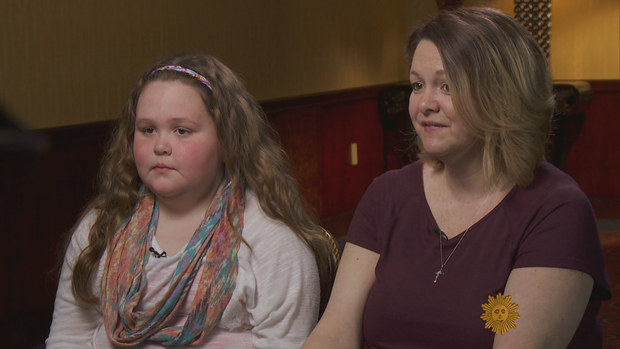The cost of miracles
Can a miracle drug also be a bitter pill? It can when the price of a life-saving prescription drug - is more than most people could possibly afford.
"Most people don't know that kids can get arthritis, too."
Ten-year-old Graci Diggs may just make you believe in miracles. Only a year ago, Graci spent much of her time in a wheelchair.
"How tough was that?" said her mother, Anna. "Seeing your child in a wheelchair is very difficult, especially when you have any child, but Graci was so outgoing, athletic. She loved sports."
When Graci was four years old, she was diagnosed with juvenile rheumatoid arthritis -- debilitating joint pain that can make even simple tasks excruciating, from trying to put on clothes, to raising her arms, using her knees, brushing her hair.
"Are there some days you just don't even feel like getting out of bed at all?" asked Moriarty.
"A lot of days," Graci said.
Yet, now Graci is playing kickball. The Diggs credit Graci's miraculous mobility to Humira, one of the nation's top-selling drugs. Since she started taking it earlier this year, her painful arthritic flare-ups have all but disappeared. That wheelchair? It's in the garage.
"She plays volleyball, softball and basketball," said Anna.
"And football," Graci added.
Humira is just one of several drugs that have transformed the lives of millions of Americans who suffer from Rheumatoid arthritis (or RA).
With similar advances made in treatments for cancer, multiple sclerosis and Hepatitis C, the pharmaceutical industry should be basking in praise. Instead it's on the defensive, trying to explain why the cost of many of these treatments is so high.
The issue came clearly into focus last September, when Turing Pharmaceuticals and its CEO, Martin Shkreli, made headlines after raising the price of a drug used to treat AIDS patients 5,000 percent. (That's NOT a typo.)
- Martin Shkreli pleads not guilty to new charges
- Martin Shkreli-style drug price hikes are everywhere
- Martin Shkreli out at another drug company
"No one was more offended by their behavior than our members," said Steve Ubl, who was named President of PhRMA -- a drug makers' trade group -- the same week that Shkreli was called the "most hated man in America."
Moriarty said, "I think you referred to him as a knucklehead."
"Yes," said Ubl. " I think what's happening, on the one hand patients are paying more for their medicine because the insurance market has shifted. And on the other hand, they see the behavior of somebody like Martin Shkreli, and they connect the dots in a way that is very misleading and unhelpful."
But some say that Shkreli's actions, while extreme, reflect a disturbing trend.
"He did it to a greater extent than probably anyone's ever attempted," said Dr. Steve Miller. "But there are other companies who are taking big price increases, less than 5000 percent, but they're taking these price increases year over year."
Dr. Miller is the chief medical officer for Express Scripts, the nation's largest pharmacy benefit manager. He negotiates with drug companies to get the best prices for health insurers. And he says drug companies raise their prices simply "because they could do it. This is just drug companies capitalizing on the situation."
Miller says when effective drugs lack competition, he has less power to negotiate, and drug companies have nearly free reign to raise prices.
How much? An analysis by Reuters earlier this year found that list prices for the bestselling drugs in the U.S. had risen anywhere from 50 to 100 percent in five years.
The drug that went up most? Graci's drug, Humira. Its list price rose from $20,123 a year in 2010, to $45, 565 a year in 2015.
Moriarty asked, "How do companies defend a 100 percent increase on a drug that's been on the market for a decade?"
"The problem with a lot of the analyses that you are referring to is that they oftentimes focus on the list price, which is a bit like a sticker price of a car," said Ubl. "It doesn't reflect the price that most people pay."
In Graci's case, her family does pay only a small portion of the cost of her medications; insurance pays 75 percent, and AbbVie, the maker of Humira, picks up much of the rest. But Graci's mom, Anna, wonders for how long?
"It's not an antibiotic," said Anna. "It's not going to go away in 10 days, no. She may be on this forever."
Many treatments for arthritis and cancer are expensive to develop because they are biologics: produced from living organisms grown in labs. Drugmakers understandably want to recoup their costs.
But there is another reason for high prices: In many other countries -- Canada, Germany, Great Britain -- the government dictates what drugmakers can charge. Guess who is making up the shortfall?
So, are Americans in effect subsidizing patients across the globe by paying more? Yes, says Ubl: "I believe that the U.S. is in some ways supporting innovation around the world."
The solution, say many, is to create more competition for these biologics with biosimilars, drugs that aren't identical but work much the same. One study estimated that the increased use of biosimilars could save the U.S. healthcare system $250 billion over the next 10 years.
"I do expect that biosimilars will have a beneficial effect," said Steve Pearson, who runs the Institute for Clinical and Economic Review, an independent think tank. "They'll be good for patients, they'll be equally effective, and hopefully the price will come down ... if they can get into the market. The early signs are that it will be contested at every step along the way.
"A lot of the effort, though, to keep the biosimilars and other competitors at bay doesn't add a lot of clinical value for patients."
The original patent for Graci's drug, Humira, expires later this year, and the FDA is set to review a biosimilar next month. But the drug maker AbbVie has filed for additional patents, determined to keep a Humira biosimilar off the market in the U.S. until at least 2022.
"Any company seeking to market a biosimilar version of Humira will have to contend with this extensive patent estate which AbbVie intends to enforce vigorously," said AbbVie CEO Rick Gonzalez.
PHRMA's Steve Ubl says biosimilars are inevitable, but that drugmakers need to make substantial profits before their patents run out to fund research into the next generation of breakthrough treatments. Otherwise we might never see the miracles like Graci Diggs.
Ubl said, "These are the most innovative, most transformative medicines. There have to be incentives to produce better treatments and cures, knowing that over the course of the lifecycle of the product it's eventually going to be essentially given away."
Of Graci's treatment, Anna Diggs said, "It works great. It's awesome, but it's expensive. It is expensive."
"But you wouldn't imagine giving it up, saying, 'Oh, I'll go try a different drug'?" asked Moriarty.
"No, no. Not as long as it's working. As long as it's working, you know, I'll go live in a tent down by the river! As long as she feels good and she can be a normal 10-year-old girl."
For more info:

